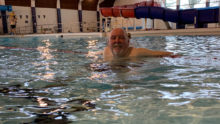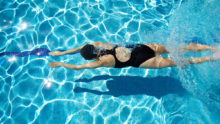
Going swimming has helped reduce the number of visits to my doctor
05/11/2019A new report commissioned by Swim England has revealed how swimming is having a huge impact on the health and wellbeing of the nation. Here, Kate Melton explains why she values swimming.
Kate Melton is a firm believer that swimming helped reduce visits to her doctor as she battled a number of medical conditions.
The 59-year-old, from Lincoln, has overcome breast cancer, had spinal fusions and undergone a double hip replacement – but says being in the pool played a key role in her recovery from all of them.
Her view backs up statistics revealed by Swim England in its Value of Swimming report, which details the vital role swimming plays in preventing, and treating, physical and mental health conditions.
In the most rigorous research ever conducted by a national governing body, Swim England has revealed that swimming is saving the NHS and social care system £357 million a year.
More than £32.6 million pounds of that total is in the Yorkshire and Humber region alone with the savings made up from:
- Dementia £12,698,696
- CHD Stroke £9,104,202
- Reduced GP visits £4,645,400
- Diabetes £3,407,603
- Colon cancer £949,433
- Breast cancer £894,561
- Depression £864,663
Nationally, a staggering £51,048,348 is saved on reduced GP visits and £9,830,341 on treating breast cancer patients.
Kate, who is now a swimming teacher after leaving her job in IT, said: “Swimming has been a massive part of my life – I do not know how on earth I would have managed without it.
“I grew up in the middle of nowhere on a farm and there was a little school but it had a swimming pool. I’m a big believer of getting kids in the water as quickly as possible so it gets in their heads the benefits for the rest of their lives.
“At the age of 27, I had my first spinal fusion. I was suffering from osteoarthritis and had a really terrible operation. As soon as I could get back into the pool, I did.
“If I’m in pain, I go and swim it off – it works every time.
“At 46, I was diagnosed with breast cancer and there was a two-year period where I could not go swimming. I had a lot of back pain, was tired and it was a really tough time.
“I had eight separate operations to do with my cancer, including a double mastectomy and reconstruction surgery. Each time I had an operation, my first question was when could I go swimming again.
Best form of exercise is being in the water
“I put on four stone in weight with the steroids used for chemo and when I started swimming again, my weight went back to normal.
“After my reconstruction surgery, which took around eight hours, I went into the pool around three or four weeks later and was swimming front crawl.
“The second time I went, it felt like I’d had nothing done at all. I went back to see my consultant and she signed me off. She said I had more movement after five weeks than most people do after five months – that’s how good it was.”
A similar thing happened after Kate had a double hip operation five years ago.
“I had to have both hips replaced due to osteoarthritis in my hip joints,” she said. “I had both replaced within six weeks and, again, as soon as I could swim I did.
“I could not do breaststroke for three months but did front crawl and backstroke. Exactly the same happened and I did not go for my six-month check up as I was absolutely fine.
“I’d taken ownership of my particular problem and I did not need to keep going back to the doctors.
“My health issues have been very complex but I have saved so much time on possible doctor appointments and I put it all down to swimming.”
Other key findings from the Value of Swimming report include swimmers report feeling, on average, 6.4 per cent healthier than non-swimmers – which is equivalent to feeling 12 years younger.
And that is something Kate clearly agrees with.
As well as inspiring others to enjoy the physical and mental health benefits of swimming in her role as a teacher, she still swims three times a week, completing a mile each time.
“The best form of exercise is being in the water,” she said. “I do not feel anything like my age.
“I have as much movement as I have always had despite the arthritis. If you saw me swim, you would not think there was anything wrong with me.
“Any pain I get, I swim it off and it works a treat – I cannot imagine life without swimming.”
 Just Swim
Just Swim



